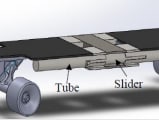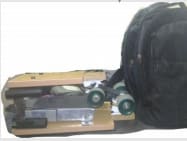Last Mile, in transportation and logistics, refers to the one last mile from the source to the nearest public transit hub. In developing countries like China, and India, shared mobility is prevalent over individual ownership of cars. Also, increasing mass transit system in these countries paves way to cover the majority of the city by public transit. Daily office goers and single person commuters prefer the public transportation system for commutation. Major challenges faced by them are in covering the last mile.
With increasing pollution, and reducing air-quality in major cities of thickly populated countries, strong emphasis is given in electrical power-train with zero emission, over conventional fossil fuels.
The cost of last mile delivery of goods and services like e-commerce home delivery, food delivery and personal transportation system; is found to be higher than the total delivery charges between any public transit hubs due to fuel cost for the given quantity.
The last mile vehicle also finds massive application in intra-campus transportation like commuting inside universities, shopping complexes, industries and offices.
In countries with denser population, outdoor sporting for children appears to be challenging due to unavailability of space. With personal last mile vehicles, the massive parking area near the public transportation hubs like railway stations, bus terminus, could be utilised for garden, parks and play grounds.
Targeted market:
1)Students
2)Working Professional
3)Delivery service providers
Description:
The novelty in design :
1) Choice and fabrication of fold-able mechanism for the skateboard
2) Light Weight structure with handling max. 100Kg load.
3) Design of suspension system for the skateboard with different variants
4) Thermal and effective air-flow analysis for effective battery temperature management
5) Cost of the total vehicle
6) Telescopic modular handlebar for beginners
Electrical Capabilities:
1)Vehicle top speed: 25Kmph
2)Total Journey range for complete charge – 20 Km
3)Battery pack – Li-Po battery with fast charging and safer construction(fireproof) and with short-circuit
alarm
4)LED lighting for front and back side of the light for night travel.
5)Control of the vehicle is by remote, handlebar, or through android application.
Manufacturability:
1) Skateboard deck is made from 5 ply layer of wood
2) Skateboard truck with wheels are bought from custom wheel assembly available in the market (Could be
customized with future variants with speed and range)
3) Tubular structure is manufactured from aluminium tubes fastened to the deck surface
4) Battery, motor, electronics, charger housing made of sheet metal forming.
5) Modular telescopic handlebar with aluminium tube.
The first prototype for the vehicle was built with Rs.24,750 ($350). Current progress involve detail design and power-train modification to reduce the vehicle cost.
Average electric skateboard cost with similar features in the market currently available is greater than Rs.40,000.
Like this entry?
-
About the Entrant
- Name:Arvind Subramanian Venkatanarasimhan
- Type of entry:teamTeam members:Mr.Arvind Subramanian V,
Mr.Praveen Chandar D,
Mr.Sriram N,
Mr.Ashwin S - Software used for this entry:Solidworks
- Patent status:pending








